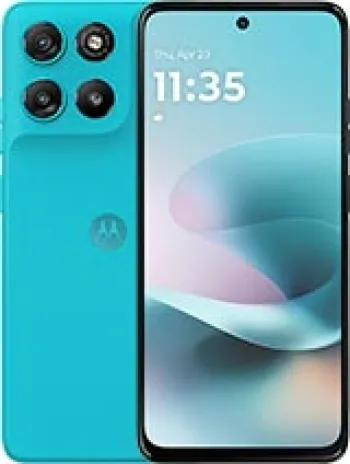
Design and Build
The Motorola PEBL U6, announced in the first quarter of 2005, is celebrated for its unique design characterized by smooth curves and sleek surfaces. The dimensions of the device are 86.5 x 49 x 20 mm, and it weighs 110 grams, making it compact and easy to handle. This design was particularly appealing at the time as it introduced a sense of elegance and uniqueness to the mobile phone market. One of the key design features was its clamshell form factor which included a soft-touch exterior that felt pleasant to hold.
Display
The PEBL U6 features a TFT display capable of displaying up to 256K colors. Despite the small screen size at 1.8 inches, the resolution of 176 x 220 pixels provided a decent level of clarity for basic mobile tasks. Although the screen-to-body ratio was around 24.1%, it served its purpose well enough for a feature phone from that era. The vibrant display was suitable for viewing contact images during calls and for navigating through menus.
Network and Connectivity
The phone operates on GSM technology and supports 2G bands: GSM 850, 900, 1800, and 1900. These bands allowed the phone to be usable across different regions globally. For data connectivity, the PEBL U6 supports GPRS Class 10; however, it does not support EDGE, WLAN, or high-speed data connectivity options that are standard in modern smartphones. Bluetooth 1.2 connectivity was available, enabling users to connect to other Bluetooth-enabled devices for data transfer.
Memory and Storage
Storage on the Motorola PEBL U6 is quite limited by today's standards, with internal storage capped at 5MB and no option for memory expansion via a card slot. This made the device best suited for storing contacts, a few text messages, and minimal multimedia files. The phonebook capacity supports up to 1000 entries with photo call functionality, which was a generous offering at the time. Call log capacity is limited to keeping records for 60 dialed, received, and missed calls.
Camera Features
On the multimedia side, the PEBL U6 is equipped with a single VGA camera. Although the 0.3MP camera would not meet modern expectations for photography, it was adequate for capturing simple images and serving users who needed to document moments on the go. The camera also supported basic video recording capabilities.
Sound and Audio
The Motorola PEBL U6 lacks a loudspeaker and a 3.5mm audio jack, which limits its usage for audio playback without proprietary accessories. For alerts, it supports vibrating alerts and downloadable polyphonic and MP3 ringtones. This feature allowed users to personalize their phones to suit their preferences, and the inclusion of a ringtone composer added an interactive and creative element to the audio features.
Battery Life
The phone is powered by a removable Li-Ion 820 mAh battery, providing respectable longevity for standard usage. The standby time is rated at up to 250 hours, while talk time is up to 6 hours and 40 minutes. Given the phone's primary functions of calling and messaging, the battery life was generally sufficient, catering to the needs of users without requiring frequent charging.
Software and Usability
The PEBL U6 runs on a proprietary feature phone operating system that enables basic functionalities, including SMS, EMS, MMS, email, and instant messaging. The inclusion of Java support (MIDP 2.0) allowed users to install various Java-based applications and games, adding to the phone's entertainment value. The presence of a WAP 2.0/xHTML browser also provided basic internet browsing capabilities, though limited by modern standards.
Additional Features
This feature phone also supported basic downloadable games, offering entertainment beyond communication functions. While it didn't boast any sophisticated sensors or a GPS positioning system, the PEBL U6's combination of features was adequate at the time for staying connected and entertained on the go. Additionally, the proprietary USB connection facilitated synchronization and data transfer with PCs.
Conclusion
The Motorola PEBL U6 stands out for its unique design and was a statement piece during its release. Although its features are rudimentary compared to today’s smartphones, the device adequately served its purpose in the mid-2000s by offering essential mobile functions with a touch of style and individuality. Priced at approximately 110 EUR during its release, it was considered a fashionable mobile device, appreciated for its design and the tactile experience it provided to its users.
Key Features of Motorola PEBL U6
- GSM Technology with quad-band coverage (850/900/1800/1900)
- Compact and lightweight design (110 g, 3.88 oz)
- Stylish clamshell form factor
- TFT display with 256K colors
- VGA main camera with video capability
- Expandable phonebook with 1000 entries and photo call feature
- Bluetooth 1.2 support for wireless connectivity
- Supports SMS, EMS, MMS, Email, and Instant Messaging
- Java support for applications (MIDP 2.0)
- Removable Li-Ion 820 mAh battery with up to 250 hours standby time
- Polyphonic and MP3 ringtones support
Disadvantages of Motorola PEBL U6
- No EDGE support for faster internet connectivity.
- Discontinued model; no longer available in the market.
- Limited internal memory of 5MB with no card slot for expansion.
- VGA main camera with limited photo and video quality.
- No front-facing selfie camera.
- Lacks a loudspeaker for hands-free audio.
- No 3.5mm headphone jack.
- No WLAN or Wi-Fi capability.
- No built-in GPS positional services.
- No FM Radio feature.
- Uses proprietary USB connection instead of a standard one.

View Also
More Phones
All Rights Reserved +14266 Phones © Mobilawy 2025

























